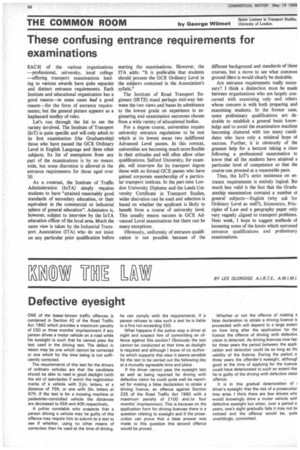These confusing entrance requirements for examinations
Page 70

If you've noticed an error in this article please click here to report it so we can fix it.
by George Wilmot University of London.
EACH of the various organizations —professional, university, local college —offering transport examinations leading to various awards have quite separate and distinct entrance requirements. Each Institute and educational organization has a good reason—in some cases had a good reason—for the form of entrance requirements; but the general picture appears as a haphazard medley of rules.
Let's run through the list to see the variety involved. The Institute of Transport (IoT) is quite specific and will only admit to its first examination (the Graduateship) those who have passed the GCE Ordinary Level in English Language and three other subjects. Its list of exemptions from any part of the examinations is by no means wide, but some discretion is allowed in the entrance requirements for those aged over 30.
As a contrast, the Institute of Traffic Administration (loTA) simply requires students to have "attained reasonably good standards of secondary education, or their equivalent in the commercial or industrial sphere of general education". Admission is, however, subject to interview by the IoTA education officer of the local area. Much the same view is taken by the Industrial Transport Association (ITA) who do not insist on any particular prior qualification before starting the examinations. However, the ITA adds: "It is preferable that students should possess the GCE Ordinary Level in the subjects contained in the Association's syllabi."
The Institute of Road Transport Engineers (IRTE) stand perhaps mid-way between the two views and bases its admittance to the lowest grade on experience in engineering and examination successes chosen from a wide variety of educational bodies.
For a degree course, universities require university entrance regulations to be met which at its lowest mean two indifferent Advanced Level passes. In this context, universities are becoming much more flexible in their attitudes and will often allow other qualifications. Salford University, for example, will interview for its transport degree those with no formal GCE passes who have gained corporate membership of a particular transport institute. In the part-time London University Diploma and the Leeds University Certificate in Transport Studies, wider discretion can be used and selection is based on whether the applicant is likely to benefit from a course of university level. This usually means success in GCE Advanced Level examinations but there can be many exceptions.
Obviously, uniformity of entrance qualification is not possible because of the
different background and standards of these courses, but a move to see what common ground tliere is would clearly be desirable.
Are entrance requirements really necessary? I think a distinction must be made between organizations who are largely concerned with examining only and others whose concern is with both preparing and examining students. In the former case, some preliminary qualifications are desirable to establish a general basic knowledge and to avoid the examination machine becoming cluttered with too many candidates who have only a minimal hope of success. Further, it is obviously of the greatest help for a lecturer taking a class following a professional examination to know that all the students have attained a particular level of competence so that the course can proceed at a reasonable pace.
Thus, the IoT's strict insistence on entrance requirements is entirely logical. Bui much less valid is the fact that the Graduateship examination contains a number ol general subjects—English (why ask for Ordinary Level as well?), Economics, Principles of Law and a geography paper only very vaguely aligned to transport problems. Next week, I hope to suggest methods of loosening some of the knots which surround entrance qualifications and preliminary examinations.






















































































































